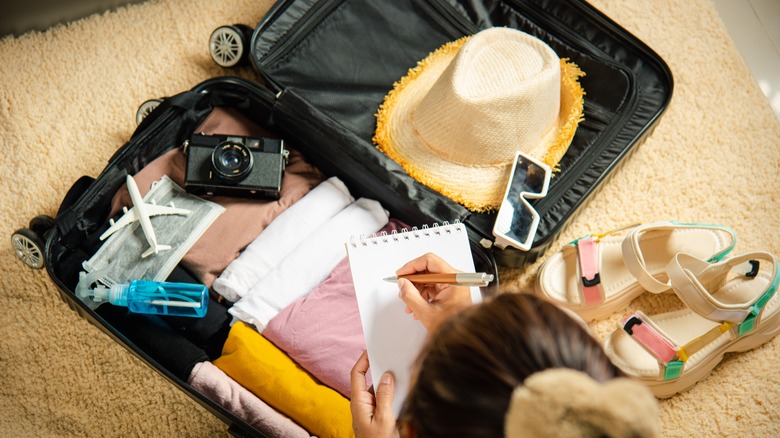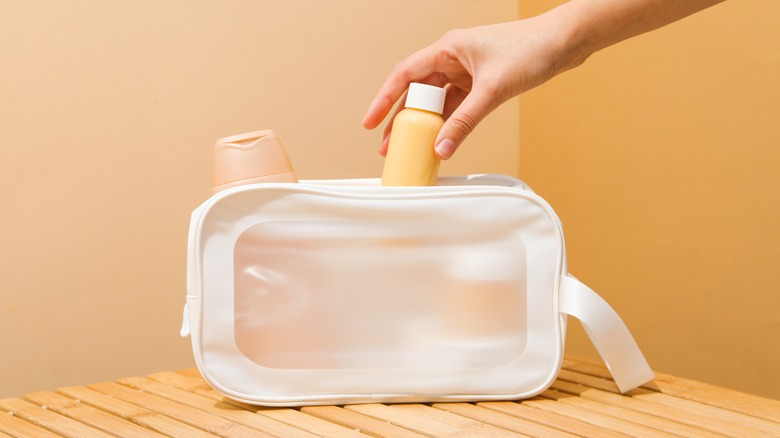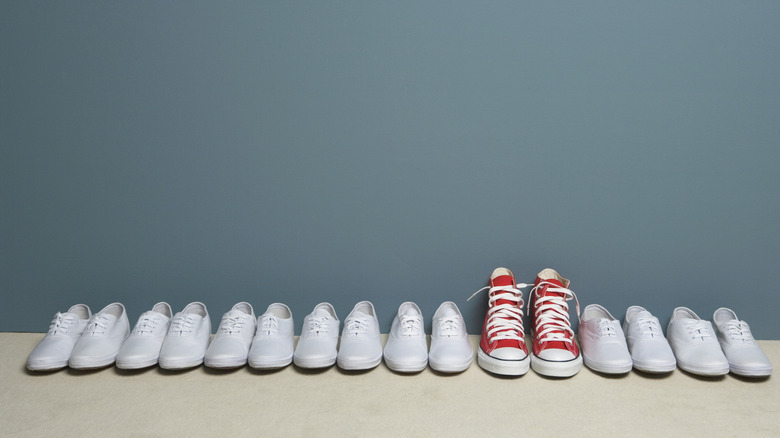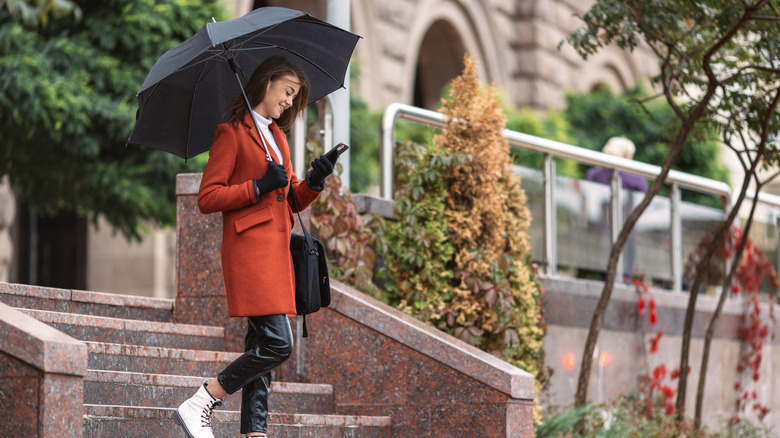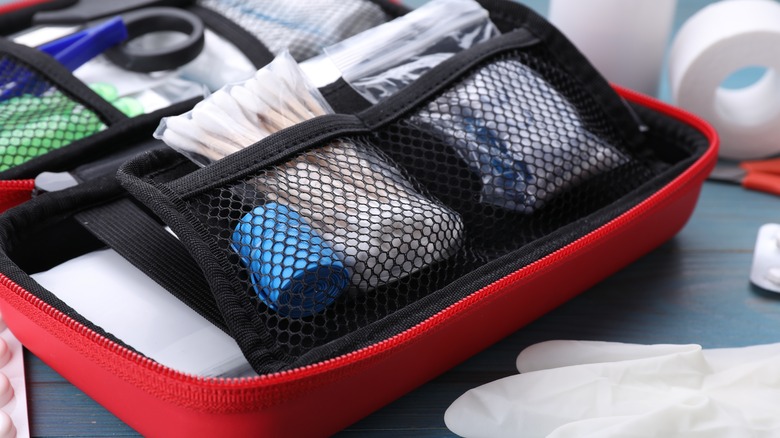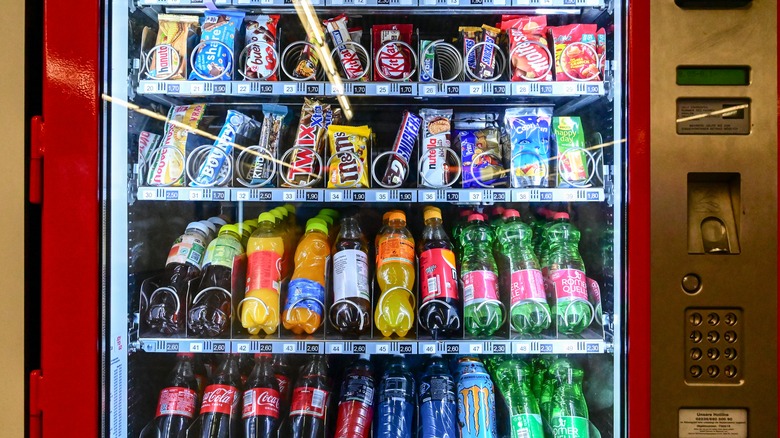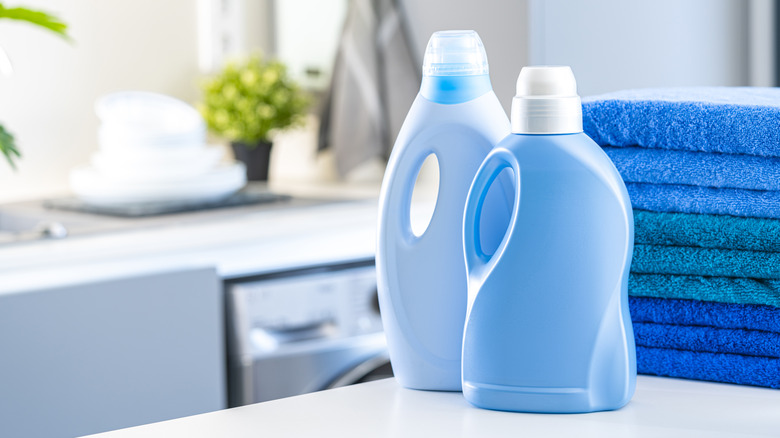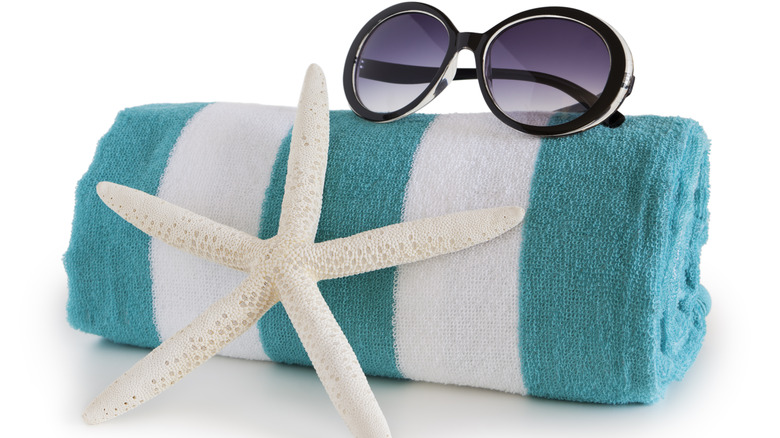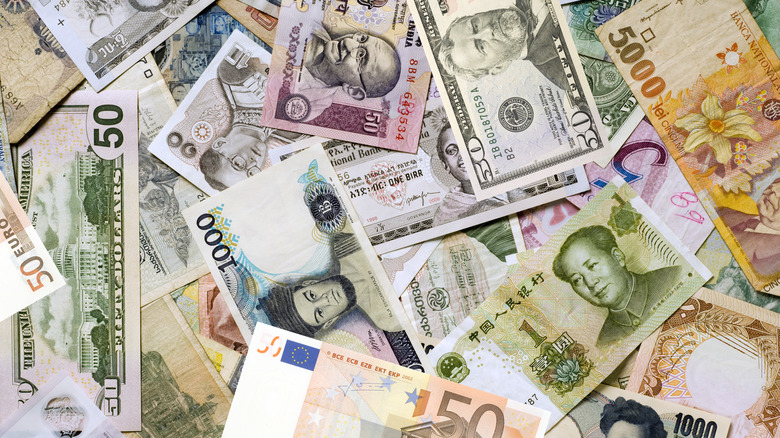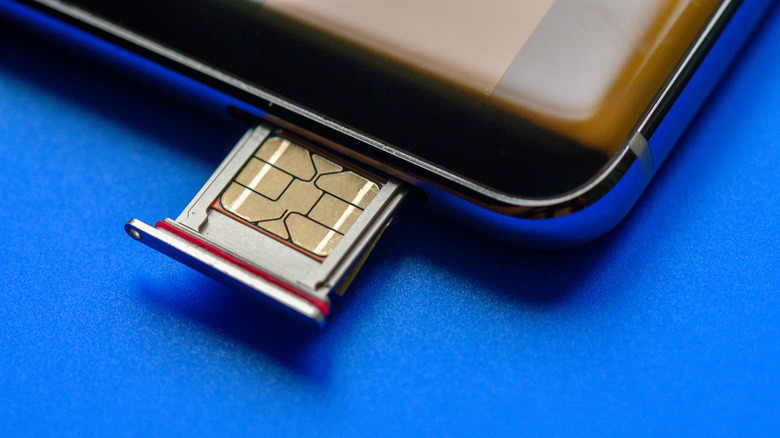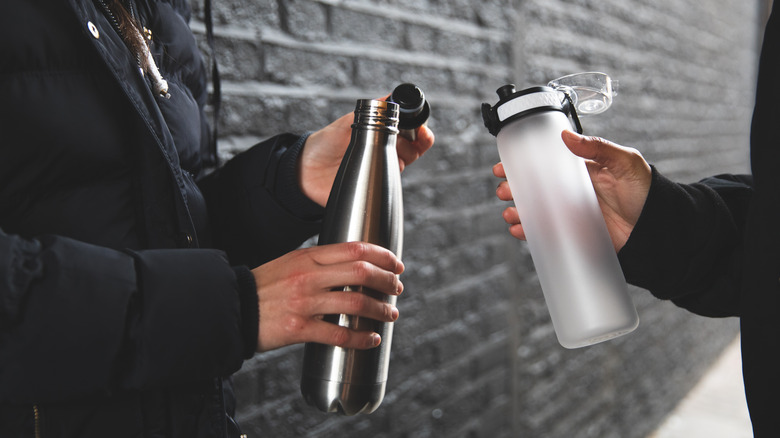Items You're Probably Packing But Should Just Buy Instead
Ever since airlines became stricter and stricter with what you could bring onboard for free, travelers have had to streamline their packing protocols. While paying extra for check-in luggage has become the norm rather than the exception, some carriers now charge for a carry-on that goes in the overhead bin. Being smart about packing for your next trip means thinking about what needs to go into your bag and what you can do without.
Many items really are essential, like the household staples you should pack when staying at an all-inclusive, medications, and travel documents, for instance. And it's always worth bringing your electronic cables — especially if you can pack all your chargers without tangles. However, several things that seem necessary can easily be left behind. Some of those you can forgo packing in the knowledge that you will find them in your hotel or apartment rental, while others are just as easy to buy at the destination, and the act of purchasing them might even be a fun part of the vacation. Read on for some ideas on what to nix when you make your next big pack.
Basic toiletries
While it's nice to use your favorite shampoo and conditioner on vacation — the ones that have that lovely scent and leave your hair looking silky — it's an unnecessary indulgence. Think of the packing logistics, as any amount of liquid exceeding 3.4 ounces (100ml) must go into check-in. Thankfully, you won't need to pack your haircare items since most hotels and even some Airbnbs have them. If shampoo isn't visible in your hotel room, you can more probably ask reception for some.
In accommodations, you will typically find soap, shampoo, conditioner, and sometimes even extras like toothpaste, disposable razors, and feminine hygiene products. Some properties will even stock toiletries from luxury brands. Even if the place you're staying doesn't offer them, these items are easy to find in supermarkets, dollar stores, and even local convenience shops. There's no need for them to take up valuable packing space.
Things you'll use once
An excursion while on a trip can be a novel way to see a destination, the kind of thing you might not do when back home. It could be a bike tour, a group outing to go birdwatching, or even a boat excursion to splash around a coral reef at a stunning snorkeling destination. But if you are going to do these sorts of things only once, is it really worth packing a bike helmet, a pair of binoculars, or a snorkel and mask that will sit idle for the rest of the vacation?
There's a good chance that the tour operator will provide all you need for the excursion or have the item available for rent — it's worth asking in advance. Also, don't pack extra shoes that you'll barely wear, it's a waste of space and you might rue the decision.
Jewelry
It goes without saying that a vacation is a time of fun, an episode of wonder and discovery. It's not a time when you'll need to necessarily dress up and show off your bling, even if you plan to post lots of snaps on social media. So, don't risk losing a precious item of jewelry laden with nostalgic, sentimental, or monetary value, and leave it at home.
Leaving jewelry at home also gives you an excuse to buy something at your destination as a souvenir, whether that's a pair of earrings in a souk in Marrakech or a pendant by the cruise port on the unforgettable Caribbean island of Aruba. Do that, and you'll also get out and about to explore local shops and pop-up markets. Exploration is one of the real joys of travel, after all.
Hair tools
Leaving jewelry at home is one thing, but having your hair look great on a trip is non-negotiable — think of all the photos you will be taking. To get your locks, bangs, and curls just right, a hair straightening tool or curling iron is a crucial weapon in your follicular arsenal.
Alas, hair tools are big, bulky and a pain to pack. Moreover, electrical appliances like these, which run on 110 to 120 volts of electricity in the US, won't work in many other countries without an adapter. For example, the standard voltage coming out of a socket in countries across Europe is 220 to 240 volts. Luckily, some hotels have hair tools in stock for guests, including brands like Kimpton Hotels & Restaurants. If they don't, and you need to buy one, they can be surprisingly affordable. In India, for example, a basic curling iron can cost as little as $9.
Books (including guidebooks)
Not long ago, it was commonplace to see tourists traveling with books in hand. You'd often see beachgoers sitting on a chair under a broad umbrella, lost in a grand piece of literature. Intrepid explorers would use extensive travel guidebooks, indispensable tomes that would illuminate an unknown destination. However, times have changed.
These are all still available, easily purchased with a click of a button, or in a brick-and-mortar bookstore. But they are heavy and can take up valuable real estate in your bag. So much of what you can see on a physical page is now available online. From downloadable guides to hyper-local blogs, it can all be accessed via your phone or tablet. That said, if your heart is set on having a physical book, consider picking one up at your destination.
Umbrellas
You never know when the heavens are going to open. Some travelers swear by a travel umbrella, with online forums filled with people who say they'd never leave without one. While these pint-sized rain protectors are certainly convenient — some are small enough to fit in the palm of your hand — they are largely unnecessary. It might not even rain where you are going, and carrying one becomes pointless. The superstitious among us might even posit that taking an umbrella is asking for the rain to come, so bring forth good omens by not packing one.
Many hotels will lend guests an umbrella if needed, and vacation rentals might also stock them. Failing that, this item won't be hard to buy. However, try to avoid purchasing one from a street vendor who materializes out of nothing when it starts to rain —these entrepreneurs often overcharge and are unlikely to stock a sturdy instrument.
First-aid kit
National organizations like the CDC recommend that travelers pack a first-aid kit when on the road, a box of supplies that should include pain relief pills, bandages, scissors, adhesive tape, and antibiotic ointment. The full list is substantially longer, and depending on what you pack, it might not be allowed on carry-on. You can also purchase a TSA-approved kit that can go in your carry-on.
However, you might never use this bulky accessory, a box of tricks to treat a cut or rash that never happens. If you suffer from a minor scrape or injury, you can ask your hotel for first-aid items — most properties will have one. If not, go out and purchase what you need at a drugstore; they are a customary fixture in almost every neighborhood. There is definitely a safety net element to carrying a first-aid kit, but they aren't as essential for travelers as they once were.
Snacks
Taking the same snacks that you eat at home with you is tempting but a little silly, especially when there could be so many new flavors on offer at your destination. Sure, there's something comforting about snacking on your favorite chips, trail mix, or granola bar on the road, but you'll do that at the expense of discovery. As one user on Reddit noted, "It's boring just to snack on a KitKat you brought with you, it's a lot more fun to stop by a food stand or corner store in a town you've never been in before."
Leave the comfort snacks at home and venture into a new food arena. From nibbles like kurkure in India (think spicy Cheetos) to Peruvian "choclo con queso" (corn with cheese), you might find your new favorite snack.
Laundry detergent
You can take laundry powder through screening, though extra screening might be needed for larger amounts. For liquid detergent, you'll be constrained by the 3-1-1 rule or be forced to place it in your check-in. The simple way to avoid this hassle is to purchase laundry powder or detergent at your destination.
You can also try a well-known hack and use the complimentary liquid soap or shampoo in your hotel room, an easy way to do hotel laundry during your stay. These might not be as powerful as standard laundry detergent, but they will work just fine, and you can properly launder your clothes when you get home. The real question is why you are looking to do your own laundry while on vacation.
Beach towels
What is better than the simple pleasure of laying down on a soft towel on the beach, the sun warming your skin, and the sounds of the lapping waves as your mellifluous soundtrack? Beach towels are an excellent accessory for the beach, but they tend to be large by definition — they are supposed to be big enough that you can lie on them comfortably. As such, they will take up a lot of space in your luggage.
Do yourself a favor and leave the beach towel at home. Hotels by the shore often have them for guests, and if you're renting an Airbnb, ask your host if they have any available for use. Another option is to buy one on vacation. Give this serious consideration since it comes with the bonus of having a nice souvenir to remember the trip, although it will take up space in your luggage on the way home.
Local currency
A staple of travel a few decades ago, traveler's checks were an ingenious, safe method of carrying money to exchange. However, the days of these monetary staples are long gone. Of course, people still need to change money when traveling overseas, and some do that before they travel so they have local bills when they land at their destination. But that can be a mistake, as they won't get as good a rate as they will in the country itself.
If you need to change money, do so after you land, with the best rates likely to be found at a local bank. Better yet, withdrawing cash from an ATM at the destination will spare you the fear of carrying large sums of money on the flight.
SIM cards
You can buy SIM cards in the U.S. that you can use overseas. Having a phone ready to use on a local network when you arrive is undoubtedly a convenient option, but this method of cellular connection presents provider choices and a variety of plans that are likely to be limited. You'll get a much better deal in your destination, where numerous phone companies are vying for your business. You can also choose to allow roaming with your U.S. plan, but be sure to check terms and rates, as this can get pricey.
The third option is to get an eSIM, a digital version of a physical SIM card that can be ordered online. Not all phones, however, are capable of using an eSIM, unlike an actual SIM card that slots into your phone. Each option has pros and cons, but there is little reason to get a physical SIM for your destination ahead of your trip.
Tripods
If you are a serious photographer, there is a good chance that you'll want to take a tripod with you. Think of the shots that you can take when the complete stillness of the camera is required — a monument in fading light, a sky at night, a cityscape with jazzy lights, or the coastline on a windy day. However, there is always the chance that you'll pack it and rarely use it, if at all.
You can replicate the effects of a tripod through simple methods, even by buying an everyday culinary staple at your vacation destination. As one Reddit commenter suggested, proposing some easy hacks, "I use a bag of rice on top of my pack, a folded jacket on top of a rock or car." Leave tripods to the professionals.
Reusable water bottles
In the drive to reduce plastic and benefit the environment, large, clunky metal and plastic reusable water bottles have become a fixture of our daily landscape. More and more airports noticed this and began to install water fountains where travelers could refill their bottles. And yet, these bottles are bulky and can weigh a lot, and as one commenter on Reddit noted, "I find them heavy and a nuisance. I leave them at home."
While it's not ideal for the environment, it is arguably better to buy a bottle at your destination and reuse that. In a country where bottled water is the only option, as tap water isn't safe to drink, you'd be using that to fill your reusable bottle anyway.
